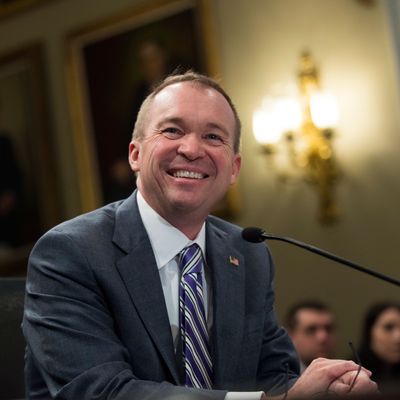
From the era of the slave trade to that of the “on contract” mortgage and the subprime loan, the financial industry has always found a way to profit from the exploitation of black people.
In fact, discriminatory lenders — and the discriminatory laws that empowered them — are among the primary causes for our nation’s gargantuan (and growing) racial wealth gap. In the run-up to the 2008 financial crisis, lending offices at major banks pushed black clients to take out subprime loans, even when their credit histories qualified them for prime ones. At Wells Fargo, loan officers referred to the African-American they targeted for usury as “mud people.” When this frenzy of speculation and predation crested and collapsed, 43 percent of all African-American wealth disappeared with it.
To prevent the recurrence of such a disaster, Congress created the Office of Fair Lending and Equal Opportunity (OFLEO), a division of the Consumer Financial Protection Bureau dedicated to policing discriminatory lending.
OFLEO quickly discovered that the housing crisis had not soured finance’s taste for fleecing racial minorities. Its investigators found that GE Capital was excluding 133,400 borrowers from debt relief because of their ethnicity — and won a $201 million settlement for the consumers the firm had exploited. They caught National City Bank charging higher mortgage interest rates to black and Latino borrowers, and Hudson City Savings Bank denying African-American communities access to credit — and hit the former with a $35 million fine, and forced the latter to provide $25 million in loan subsidies to its victims. OFLEO discovered rampant discrimination in auto-loan financing and won some $143.9 million in penalties from the predators.
But to the Trump administration, this catalogue of enforcement actions does not add up to a small triumph for racial justice, but a tyrannical attack on the “free market.” And the Consumer Financial Protection Bureau now rests in the hands of Mick Mulvaney, who devoted much of his congressional career to defending the interests of predatory lenders in general — and racist ones, in particular. And so, this week, Mulvaney stripped OFLEO of its enforcement powers:
The Trump administration has stripped enforcement powers from the Consumer Financial Protection Bureau office that specializes in pursuing cases against financial firms accused of breaking discrimination laws, according to two people familiar with the matter and emails reviewed by The Washington Post.
… Now that office, which had been part a powerful CFPB division, will move inside the office of the director, where staffers will be focused on “advocacy, coordination and education,” according to an email Mulvaney sent them this week. They will no longer have responsibility for enforcement and day-to-day oversight of companies, he said.
Instead, those responsibilities will remain with the division of supervision, enforcement and fair lending, which conducts oversight and enforcement actions in a wide range of cases of financial wrongdoing. The Office of Fair Lending had previously been part of this division.
The Intercept’s David Dayen lays out the likely implications of this move:
The best guess for what this means is that OFLEO moves under the director, and the oversight and enforcement staffers either move with it and get reassigned tasks of advocacy, coordination, and education, or they stay in SEFL, where they would have a variety of duties across all levels of enforcement, not just fair lending. What’s more, the head of OFLEO, Patrice Ficklin, will be sequestered in a separate office, unable to fight turf battles over prioritizing fair lending cases.
OFLEO already conducted advocacy, coordination, and education through engagement with the industry. But segregating enforcement and supervision takes the stick away from the carrot.
Additionally, almost nothing at the CFPB sits within the Office of the Director, and certainly not anything enforcement-related. The move suggests that Mulvaney particularly wanted this element of enforcement and supervision under his thumb.
Civil-rights advocates have, of course, lambasted this development.
“Mulvaney’s decision falls squarely in line with the approach that the Trump Administration has taken regarding civil rights — undermine critical civil rights safeguards and those in government responsible for enforcing them under the guise of ‘efficiency’ and ‘accountability,’” Shanna L. Smith, president of the National Fair Housing Alliance, said in a written statement. “But by taking away the Office of Fair
Lending’s enforcement authority, the Trump Administration has sent a signal to the financial services industry that they can operate without fear of repercussions for discriminatory policies, practices, and products.”
In the summer of 2016, Donald Trump’s pitch to black voters was simple: “What the hell do you have to lose?”
Since his inauguration, the president, and his administration, have made a near-daily effort to demonstrate that the answer to that question was “quite a lot.”
Correction: An earlier version of this article suggested that PNC Bank engaged in discriminatory lending practices. In fact, a bank that PNC purchased (National City Bank) had engaged in such practices, which were discontinued once it was brought under PNC’s roof.






























